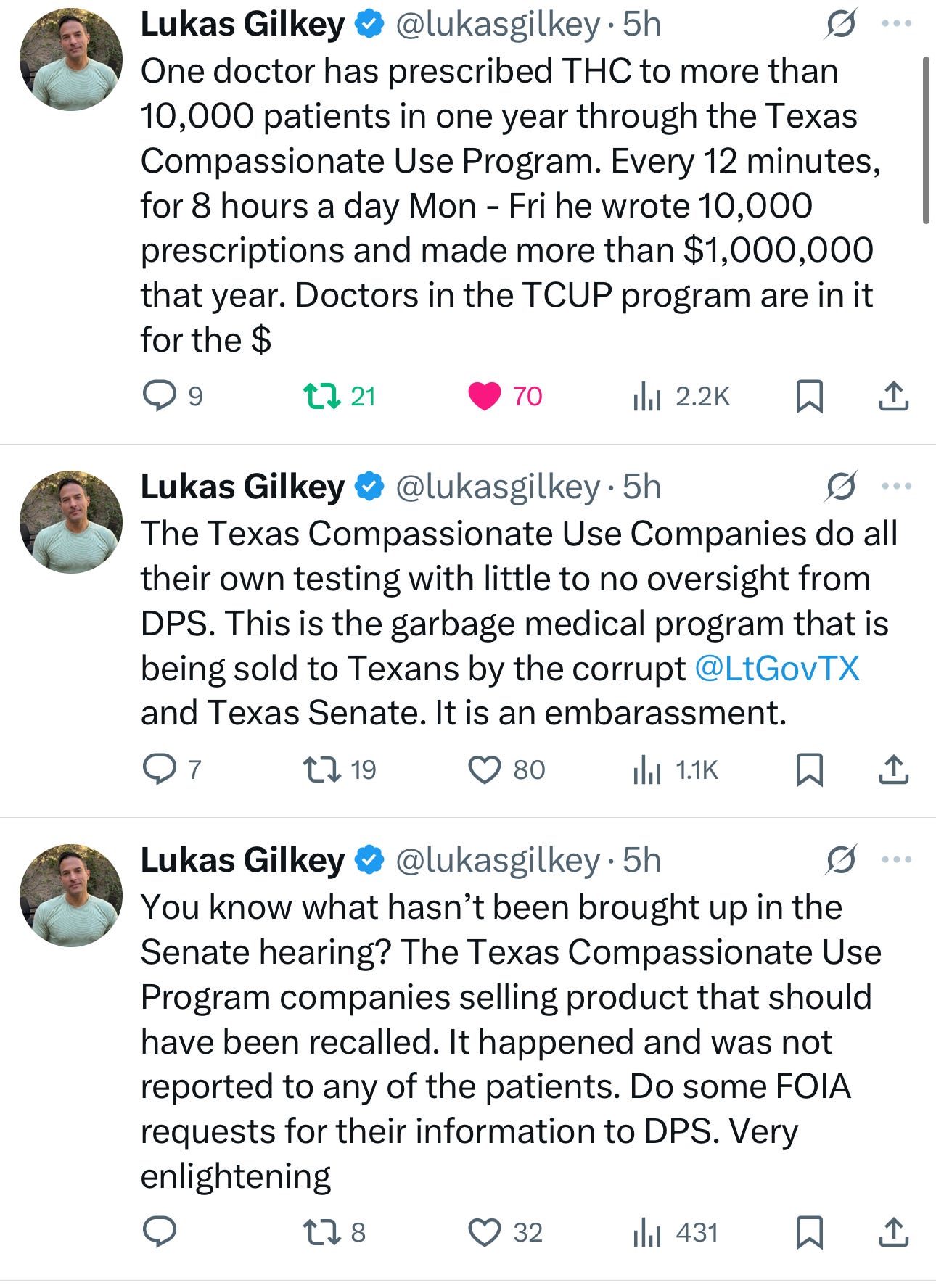Texas Senate Advances SB5 Hemp Ban Amid Perry’s Outlandish Claims and Data Gaps in Floor Debate
In a heated floor debate on July 30, 2025, during the Texas Legislature’s first special session, the Senate voted 20-9 to advance Senate Bill 5 (SB5), a controversial measure that would impose a near-total ban on consumable hemp products containing intoxicating cannabinoids like delta-8 and delta-9 THC. Authored by Sen. Charles Perry (R-Lubbock), the bill aims to close loopholes from the 2019 hemp legalization, restricting sales to non-intoxicating options such as CBD and CBG for adults 21 and older. While supporters touted public safety, the session was marked by Perry’s hyperbolic rhetoric and his inability to provide concrete data on the alleged dangers, raising questions about the influence of special interest groups behind the push.
The special session, called by Gov. Greg Abbott after vetoing a similar bill (SB3) in the regular session, has focused on hemp regulation amid growing concerns over unregulated products. SB5 progressed rapidly: Introduced on July 21, it cleared the Senate State Affairs Committee on July 22 after a nearly seven-hour hearing filled with testimony from veterans, business owners, and law enforcement. Today’s floor action, streamed live on the Senate’s website, featured pointed exchanges that exposed the bill’s shaky evidentiary foundation.
Perry’s Comical Claim: Gummies That Make You “Trip for Four Days”
During the debate, Sen. Perry defended SB5 by painting a dramatic picture of the risks posed by hemp-derived edibles. In a moment that drew chuckles and eye-rolls from observers, Perry claimed that certain THC gummies could cause users to “trip for four days,” exaggerating the psychoactive effects to emphasize his argument for a ban. This hyperbolic statement, reminiscent of outdated Reefer Madness-style fearmongering, was intended to highlight public safety threats, particularly to youth. Perry argued that unregulated products have flooded the market since 2019, leading to confusion with marijuana and potential health risks. However, critics on social media and in advocacy circles mocked the remark as unscientific and theatrical, with one X user quipping, “Sen. Perry must have tried some space gummies from another planet.” The claim lacked supporting evidence, fueling accusations that Perry was amplifying anecdotes to push the bill forward.
Unanswered Questions: Sen. Molly Cook Grills Perry on THC Overdoses and Deaths
The debate took a more serious turn when Sen. Molly Cook (D-Houston) pressed Perry on the bill’s necessity, asking pointedly about the number of THC overdoses in Texas and how many had resulted in deaths. Perry, caught off guard, admitted there was “no data or anything that would show the actual numbers,” citing a lack of comprehensive tracking for hemp-related incidents. This response highlighted a critical gap: While Perry and supporters referenced vague concerns over youth access and enforcement challenges, they provided no empirical statistics to justify the sweeping ban. Cook, a vocal opponent, used the moment to argue that the bill was overreach without proven harm, comparing it favorably to alcohol, which causes thousands of deaths annually but faces no similar prohibition.
This exchange proved damning for Perry’s case, as it underscored the absence of data-driven policymaking. National studies, including from the CDC, show THC overdoses are rare and non-fatal compared to other substances, with zero reported deaths from THC alone in recent years. Opponents seized on Perry’s admission, arguing it revealed the bill’s true motivations: catering to special interest groups like the alcohol industry and law enforcement lobbies, which view hemp as competition and a source of enforcement funding. Groups such as the Texas Beer Alliance and police associations have backed similar measures, donating significantly to key legislators, including Perry. Advocacy organizations like the Texas Hemp Business Council accused Perry of “working solely on the behest of special interests,” pointing to the economic fallout—a potential $8 billion industry wipeout and thousands of job losses—without offsetting benefits.
Overall Debate and Vote Outcome
The floor session, lasting about two hours, saw bipartisan pushback but ultimately passed on second reading, with Lt. Gov. Dan Patrick praising the “bipartisan” effort. Other highlights included discussions on amendments for stricter labeling and concerns from rural senators about farm impacts. A final third reading is slated for later this week, after which SB5 heads to the House, where a more regulatory approach may prevail.
Public reaction was swift and divided. Hemp advocates, including veterans relying on these products for PTSD and pain relief, flooded X with criticism, using hashtags like #KillSB5 and #PerryLies. Supporters, like anti-marijuana group SAM, hailed the vote as a win for safety. If enacted, SB5 could criminalize possession with misdemeanor penalties, reshaping Texas’s hemp market overnight.
This debate exposes deeper issues in Texas policymaking: When lawmakers prioritize unsubstantiated fears over data and public input, special interests often fill the void. As the bill moves forward, calls for transparency—and perhaps a voter referendum—grow louder. For video archives, visit senate.texas.gov.


